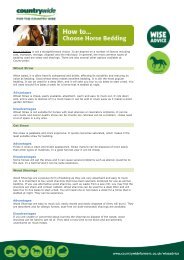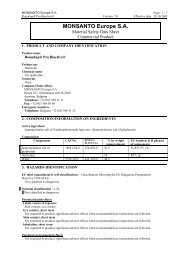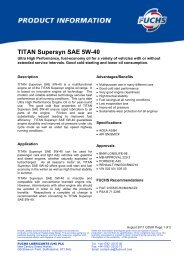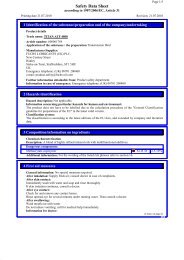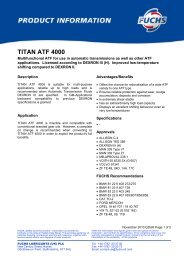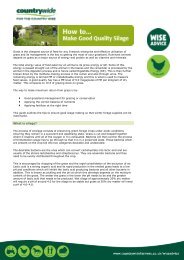THE EQUESTRIAN EVENT OF THE YEAR! - Countrywide Farmers
THE EQUESTRIAN EVENT OF THE YEAR! - Countrywide Farmers
THE EQUESTRIAN EVENT OF THE YEAR! - Countrywide Farmers
- No tags were found...
You also want an ePaper? Increase the reach of your titles
YUMPU automatically turns print PDFs into web optimized ePapers that Google loves.
AdvertorialEquine Metabolic Syndrome and Insulin ResistanceSimon Joyner from Western Counties Equine Hospitalwho holds the RCVS Certificate in Equine Orthopaedics.Equine metabolic syndrome is a very commonproblem as it is estimated that 90% of cases oflaminitis seen in this country will have someform of underlying hormonal predisposition,with an increasing number caused by equinemetabolic syndrome. The number of cases oflaminitis triggered by a true single episode ofovereating or illness is actually relatively small.While for many years we have knownthat being overweight predisposes equines tolaminitis it is only very recently been shownthat elevated levels of insulin alone can directlycause the condition, therefore if we can controlthe levels of insulin we can reduce the risk oflaminitis.When clinical signs such as abnormal fatdeposits (crest, shoulders, croup), difficultygetting the horse to lose weight and possiblylaminitis lead us to suspect the condition,blood tests can be taken in the fasted horseand measures glucose, insulin, cortisol andcirculating fats to work out at metabolism. Acombined insulin – glucose tolerance test canalso be run.Laminitis is no longer a seasonal condition.Reducing calorific intake to below maintenancerequirements is crucial. Increasing exercise levelsis also beneficial and has been shown to have adirect effect in increasing insulin sensitivity.The biggest problem are those cases that alreadyhave laminitis which makes exercise impossibleand therefore achieving any meaningful weightloss to bring the condition under control is veryhard. Luckily drugs designed for human obesitysuch as “Metformin” that, while unlicensed inhorses, do seem to be effective. These increasethe cells sensitivity to insulin, allowing glucoseto enter cells and be utilised promoting weightloss and importantly lowering insulin levels.In summary, if you have a horse or ponythat is overweight, act now before the onsetof laminitis that may then require lifelongmanagement. If weight loss seems especiallydifficult or for more information contact yourveterinary surgeon.



